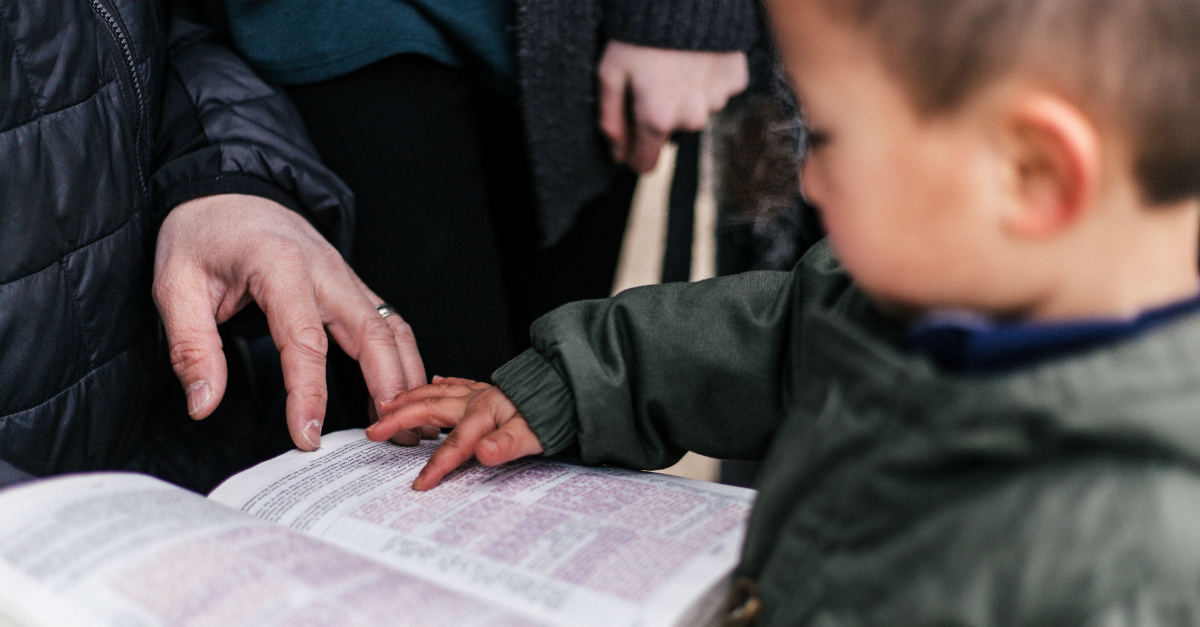What Is the Role of a Parent?

Children are Hard Work
I'm not a sociologist, nor am I a psychologist. I was a Bible and English teacher for 14 years, I've been a wife for 14, and a mom for 10. As an observer of humans, I would have to say that a recipe for adulthood includes one spouse and some unspecified number of children. It is certainly not across the board, so I will not entertain all the qualifications on that.
However, if I ever asked my high school juniors or seniors to think about their futures, a spouse and children were typically part of their mind's crystal ball. Many of my students were around children much younger than them. Either younger siblings or cousins, or even kids they worked with to get community service hours. Several of them coached sports teams for kids or even babysat on the weekend. So, it's not like children are foreigners or aliens to them. I mean, even my own daughters want children one day.
Does Anyone Think about the Work?
But no one goes into building a family thinking of how much work a child will be. It's usually all about the name, their possible future hobbies or activities, future education opportunities, and which vaccination schedule to follow—big decisions, fun, and not so fun.
But to sit around and bemoan the amount of work required until they (hopefully) move out? And even then, the work is not done; it just changes. No—we didn't do that before the arrival of any of our daughters.
And why? Because we love children! We love our family, and we want it to grow and reach other families. And primarily because the Lord told us to be fruitful and multiply—to raise more ambassadors for Christ. However, if we don't look at children from a biblical worldview, we will grow wildly dissatisfied, the expectations impossible to attain. Our families will be built on shadows and vapor. Yet, if we don't consider the work that goes into a child, that will precisely be our lot.

Photo credit: ©evgenyatamanenko
What Children Cannot Do for Us
We will get to what children can do. But first, let's look at what children cannot do for us.
1. Kids cannot be viewed as accessories to life.
I recognize how precious maternity photoshoots, infants placed in wicker baskets, matching family pajama nights, and beach photos at sunset are. When you see a whole family wearing earth tones to church, I'm sure you smile fondly, too. But this surely is unsustainable when it comes to something of substance and reality. Yes, I do bribe my daughters with mini marshmallows to smile for a picture (free tip: the mallows don't stain their mouths, so everyone's teeth stay fresh and clean looking). But they aren't automatons—sometimes they won't have it. If I looked at them as mere props to boost my social media accounts or portraits over the mantel, then I would be quick to withhold affection from those who maintain their lofty scowls.
2. Kids cannot rectify loneliness—and do you know why?
Because children don't need to be taught the word "no." And do you know why? Because children are born selfish. This is chiefly due to immaturity and developmental markers not yet achieved. If a creature is naturally selfish, they will not be equipped to fill your loneliness. There is nothing in man, any man, no matter the age, that can truly satisfy a lonely spirit.
3. Kids cannot save a marriage.
As Christians, we know money cannot solve all our problems. We know pleasures, hard work, or good counsel cannot solve all our problems. We know that only God can fix the things we break—but we can easily fall into a rhythm of believing that good gifts from the Lord will be what does the trick. This is why people medicate with food, travel, or other people. A marriage whose foundation is built upon children is not sustainable, nor is it God-honoring. Children are remarkably unsteady people to tether ourselves to. A marriage must model God's outline of the husband loving and laying his life down for the wife as the wife submits to his leadership—Jesus and the Church. The children are the gifts and blessings that overflow from the union, not the epoxy.
The Flipside
But what kids can and will do? Quite simply: Kids will change the world because they will one day become the world.
We live in such an immediate, "live no more than 30 minutes at a time" world that it is challenging to think about what we want our family outcomes to be once our children grow to adulthood. We most likely have a rough idea because we know so many adults we revere and like as well as adults we are fearful of ever running into again. Parents would certainly prefer their children to be like the former.
But it is a lot of work to raise a child—"rear" a child is the appropriate term. And I do not think that is just a matter of pretentious English semantics. When we think about the word "raise,"—there is a self-reliant aspect to it. You raise yourself off the ground after a hard workout because that is a natural next step. Bread raises itself because the yeast in it is doing what its natural intention is to do. It is an active verb. But "rear"—now that is passive. There is a doer and a direct object that is the receiver. Rear is the work the parent must do, and the raise is what the child must do from his bed in order to obey the rearing. So, this rearing is a lot of work on the part of the parent because kids are messy—and I mean that both physically and socially.
They are messy because they naturally like glitter and confetti. They want to smash the tower of blocks rather than build it. They want to step on all the cheerios on the ground instead of picking them up. They would rather paint with their hands, leave the milk mustache, stomp in a muddy puddle, climb up the banister instead of taking the stairs, and wipe their sweaty or sticky face on their sleeve—or your sleeve.
Just yesterday, our family of five was in my husband's truck. Our five-year-old had a snack of tiny breadsticks with Nutella for dipping. She ran out of breadsticks, so one of her big sisters told her just to use her fingers. When she was done, she asked if I had a napkin, which I am proud of her for recognizing her need there. However, all I could find was one stray sock with penguins on it under the seat. She asked me to hand it to her. When I did, my thumb discovered a wadded-up piece of gum in the sock. With a commonsensical tone, she laid claim to that gum from a week prior. See—messy.
Our Work
We must teach them that we are not always to be disheveled and grubby—we must also be so fresh and clean. We are not just to consume—we must also produce. We are not only to destroy—but we must also build and preserve.
But we must teach them these things. We are most certainly born with instincts, propensities, abilities, and leanings. But they all come with rough edges, to say the least, and must be rounded out. However, what is missing in them is more prominent than what is there from birth. And those holes will be filled as well as those rough edges rounded out. But they will find something to fill themselves with if we do not do the work of filling them ourselves.
Another way to think of it is that if I left dinner plans up to my girls (ages 10, 8, 5), it would be Cheetos, chocolate pudding, and a cheese stick. Left to themselves, they will fill their bellies because they even subconsciously know their physical being is lacking. The same is true of their spiritual and intellectual beings.
Nobody believes in nothing. That is impossible. The same is true with interests and concerns. Yes, our children will have preferences and tastes of their own—but the parents have the responsibility to build that palate from which they choose their proclivities and aversions. And everything up to this point is just to hope they are good humans, decent citizens, and even thoughtful friends to those they end up doing life with.

Fill Their Souls
What about their souls? There are seven (or eight—depending on who you ask) major worldview questions that everyone does indeed have an answer to. You do not have to be aware of your responses or even be able to adequately defend yourself. You, as an adult, have life experiences that have filled you. You have people who have shaped you.
Your answers to these before you put words to it are considered your presuppositions, and they are profound.
Who is God and what is He like; what is the origin of the universe; what is the nature of man; what is the basis of ethics and morality; what is the cause of evil and suffering; what happens to man after death; what is the purpose of history—
Your child's answers to these questions will shape who he is and how he will conduct himself. All our children will have answers to these, and the Lord expects parents to be the ones who direct them. Deuteronomy 6 and Ephesians 6 both speak to how we are to always talk of the Lord with our children, instructing them and disciplining them in the way of the Lord.
And—I think I have mentioned this a few times already—this is a lot of work!
The Ox and the Fruit
Proverbs 14:4 says, "Where there are no oxen, the manger is clean, but abundant crops come by the strength of the ox."
I've heard this verse used to encourage productivity. But once, I listened to a sermon that used this to describe parenting. We should not be afraid of the mess, because if that mess was not there, then that is because the children are not there. And if the children are not there, then abundant crops would not prove present either.
And this goes beyond a husband and a wife being fruitful and multiplying. The non-linear means of rearing a child in the way of the Lord, modeling the fruits of the spirit and repentance and forgiveness and extending compassion, will surely bear fruit in those children. They will grow stronger in the Lord, yielding their own abundant crops.
So, What to Do Now?
1. Provide Biblical answers to those worldview questions above. If your child believes in God but says He is controlling and restrictive, then you know what to fill that hole with. If they have an accurate picture of God but believe they are their own basis of ethics and morality, then fill that hole with Scripture as our only standard.
2. Correct foolishness, not childishness. My husband and I are still walking through this one—loud singing to a song while using a sock over their hand as a microphone—childish (and awesome). Sneaking candy from the pantry—foolish. Only the latter hole must be filled.
3. Use the Lord's energy and not your own. Colossians 1:28–29, "We proclaim Him, admonishing and teaching everyone with all wisdom, so that we may present everyone perfect in Christ. To this end I also labor, striving with all His energy working powerfully within me." Ask the Lord when to speak and when to rest. Being in His Word will give you discernment to make sure you aren't working to make your child a perfect accessory rather than a holy and blameless saint.
Yes, our children are messy. Honestly, it was fun to come up with the list above because every one of those is true of my own daughters. My desire for tidiness (which is sometimes too strong) cannot come before my desire to rear strong little oxen. And so, I choose the work, daily. I ask the Lord to help me strive with His energy to be ready to give a word when needed and when to sweep up the craft time carnage and move on.
Related Resource: The Famous at Home Podcast
The Famous at Home podcast with Josh and Christi Straub helps you stay emotionally engaged and connected to your biggest fans - the people in your homes. In this episode, we talk about how to let go of "the chase" and refocus on nurturing your marriage and your kids. Click the play button below to listen!
Photo credit: ©Unsplah/Jessica Rockowitz
Kate Stevens is a worshiper, wife, and mom, and with the help of the Lord, that is her hierarchy of work. Beyond this, she works with the youth and children at her church and edits as a freelancer. She enjoys reading, writing, running, cooking, and practicing thinking pure and lovely things.
After being unsure if they ever wanted children, the Lord eventually blessed Kate and her husband Clint after nearly three years of waiting. They welcomed their first daughter in 2011, another daughter in 2013, and yet another daughter in 2016. Kate considers this her most time-consuming, emotion-full, sanctifying, not always pretty but trusting in the Lord’s plan, and blessed work. Stuck in a house with four females, her husband Clint consistently reminds Kate of her identity and union in Christ.
You can read more of Kate's work here.
Originally published November 11, 2022.







